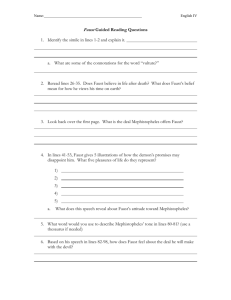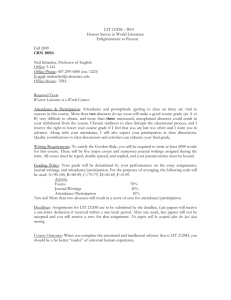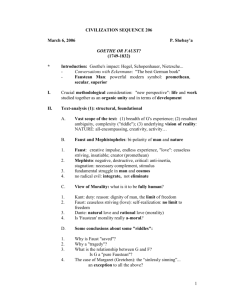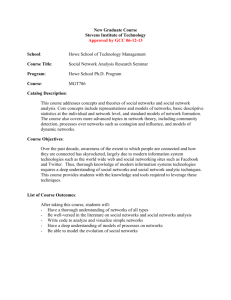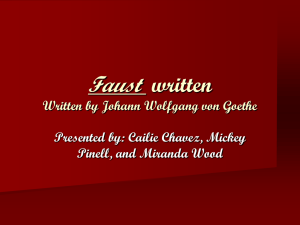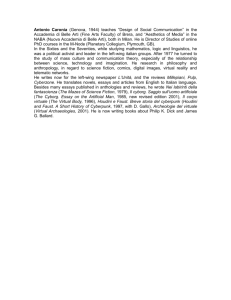Mrs Faust Notes
advertisement
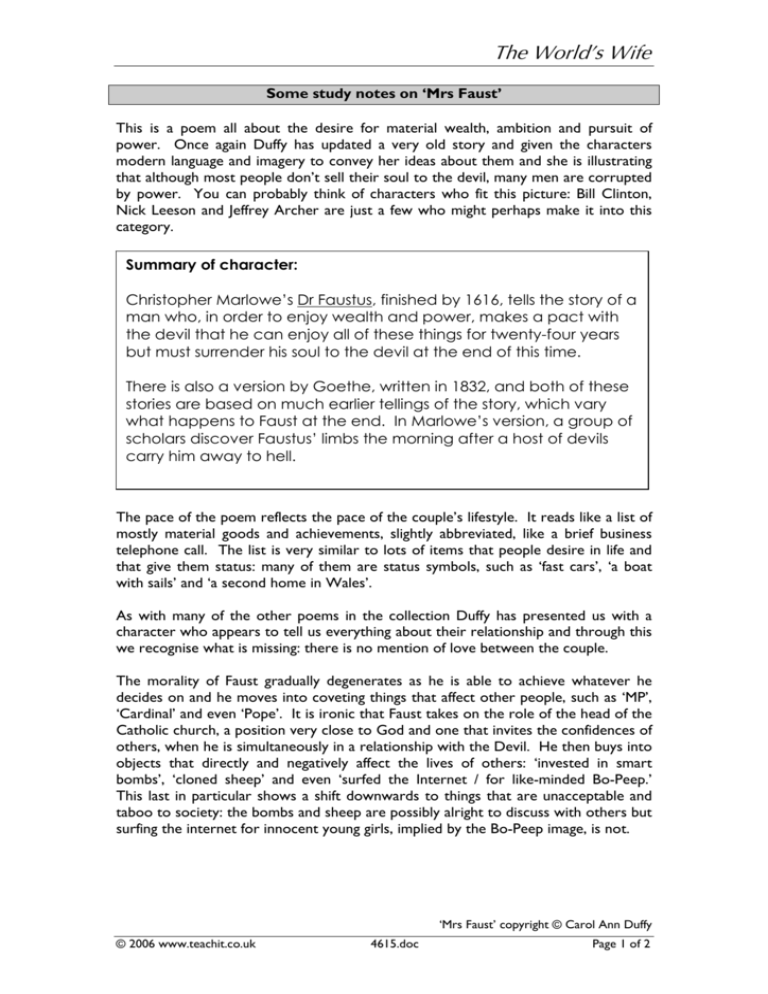
The World’s Wife Some study notes on ‘Mrs Faust’ This is a poem all about the desire for material wealth, ambition and pursuit of power. Once again Duffy has updated a very old story and given the characters modern language and imagery to convey her ideas about them and she is illustrating that although most people don’t sell their soul to the devil, many men are corrupted by power. You can probably think of characters who fit this picture: Bill Clinton, Nick Leeson and Jeffrey Archer are just a few who might perhaps make it into this category. Summary of character: Christopher Marlowe’s Dr Faustus, finished by 1616, tells the story of a man who, in order to enjoy wealth and power, makes a pact with the devil that he can enjoy all of these things for twenty-four years but must surrender his soul to the devil at the end of this time. There is also a version by Goethe, written in 1832, and both of these stories are based on much earlier tellings of the story, which vary what happens to Faust at the end. In Marlowe’s version, a group of scholars discover Faustus’ limbs the morning after a host of devils carry him away to hell. The pace of the poem reflects the pace of the couple’s lifestyle. It reads like a list of mostly material goods and achievements, slightly abbreviated, like a brief business telephone call. The list is very similar to lots of items that people desire in life and that give them status: many of them are status symbols, such as ‘fast cars’, ‘a boat with sails’ and ‘a second home in Wales’. As with many of the other poems in the collection Duffy has presented us with a character who appears to tell us everything about their relationship and through this we recognise what is missing: there is no mention of love between the couple. The morality of Faust gradually degenerates as he is able to achieve whatever he decides on and he moves into coveting things that affect other people, such as ‘MP’, ‘Cardinal’ and even ‘Pope’. It is ironic that Faust takes on the role of the head of the Catholic church, a position very close to God and one that invites the confidences of others, when he is simultaneously in a relationship with the Devil. He then buys into objects that directly and negatively affect the lives of others: ‘invested in smart bombs’, ‘cloned sheep’ and even ‘surfed the Internet / for like-minded Bo-Peep.’ This last in particular shows a shift downwards to things that are unacceptable and taboo to society: the bombs and sheep are possibly alright to discuss with others but surfing the internet for innocent young girls, implied by the Bo-Peep image, is not. ‘Mrs Faust’ copyright © Carol Ann Duffy © 2006 www.teachit.co.uk 4615.doc Page 1 of 2 The World’s Wife Duffy is not condoning the behaviour or actions of Mrs Faust, who admits, ‘I grew to love the lifestyle’ and does not feel ‘jealousy’ and ‘went my own sweet way’. Mrs Faust’s activities are all to do with appearance and her body, such as ‘colonic irrigation’, ‘had a facelift, / had my breasts enlarged, / my buttocks tightened’. In one stanza Duffy appears to mock the actions of women who talk about ‘finding themselves’ and seem to adopt a frugal lifestyle but actually achieve nothing and are still in a privileged position. Mrs Faust becomes ‘teetotal, vegan, / Buddhist, 41’ but at the end of the stanza after changing her hair colour and running away, merely ‘went home’. There are hints in the poem of Mrs Faust’s loneliness, expressed through phrases such as, ‘I grew to love the lifestyle, / not the life.’ and the fact that Mrs Faust goes ‘her own sweet way’ and apparently alone. Look at the lack of regret Faust has for what he has done. Duffy’s diction shows he is unconcerned and unrepentant. The persona of Faust talks about ‘gagging for it’ and ‘going for it’. There is no apology and no remorse in the language. The humour of the poem is in the attention to detail Duffy provides. For example when Faust is dragged down to hell the devil pokes his hands up ‘through the terracotta Tuscan tiles.’ Even at this moment of judgement Mrs Faust is keen for the reader to know that the kitchen tiles are the ‘right’ colour and style. The last stanza exposes Mrs Faust’s own shockingly immoral behaviour. Her response to Faust’s doom is ‘C’est la vie’, a phrase similar to a shrugging of the shoulders in response to a minor problem. She buys a kidney ‘with my credit card’, hinting to the reader the shockingly gruesome origins of her donated organ. At the end of the poem the irony of the situation is explicitly revealed. Faust has even tricked the devil because he ‘didn’t have a soul to sell’. He is the ultimate salesman who has clinched the ultimate deal. Mrs Faust’s opinion of her husband is also made overtly obvious as her final words about him are that he is a ‘clever, cunning, callous bastard’: hardly words of love. ‘Mrs Faust’ copyright © Carol Ann Duffy © 2006 www.teachit.co.uk 4615.doc Page 2 of 2

